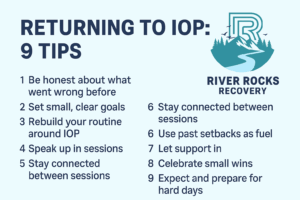It’s not unusual to step away from treatment before you’re ready. Life gets complicated. Motivation changes. Sometimes it just feels like too much.
Coming back to River Rocks Recovery’s IOP in Middletown, Ohio doesn’t mean you failed—it means you’re willing to try again. That takes courage. And this time, you can set yourself up for a better experience by making a few intentional choices from the start.
1. Be Honest About What Went Wrong Before
You don’t need to share every detail of your absence, but it helps to let your treatment team know what made you stop coming last time.
Maybe your work schedule changed and you couldn’t make sessions. Maybe you were feeling burned out and avoided calls. Maybe you weren’t sure how to connect with the group. Whatever the reason, being open about it gives your team the chance to adjust your plan so those same issues don’t trip you up again.
It’s not about explaining yourself—it’s about giving your recovery the best possible conditions to grow.
2. Set Small, Clear Goals
When you return to IOP, it’s tempting to think, “This time I have to fix everything.” That pressure can be overwhelming.
Instead, focus on one or two small, meaningful goals for your time in the program.
- Maybe it’s showing up for every scheduled session for the first two weeks.
- Maybe it’s speaking up at least once per group.
- Maybe it’s practicing one coping skill daily.
These smaller goals give you something achievable to celebrate—and momentum tends to build from there.
3. Rebuild Your Routine Around IOP
Structure is one of the biggest benefits of IOP. It works best when you make it the backbone of your week.
Treat IOP like a non-negotiable appointment, the way you would a work shift or a doctor’s visit. Block the time in your calendar, plan errands and social time around it, and prepare your space and materials before each session.
If you’re also looking for IOP in Hamilton, Ohio, we can help you find a schedule that fits with your other responsibilities. When treatment is integrated into your routine, it’s much easier to stay engaged—especially on the days when motivation is low.
4. Speak Up in Sessions
If you didn’t feel connected to your first IOP experience, it might be because you stayed quiet.
This time, try sharing a little more—even if it’s just answering one question or commenting on something that resonated with you. Participation isn’t about being the loudest person in the room; it’s about making sure your perspective and needs are part of the conversation.
Every time you speak up, you give yourself the chance to be understood and supported in ways you might not have expected.
5. Stay Connected Between Sessions
The hours outside of IOP matter just as much as the ones inside.
Keep in touch with peers you trust. Practice your coping skills daily, even in small moments—deep breathing before a tough conversation, writing down triggers when they come up, or reviewing session notes before bed.
If you hit a rough patch, reach out to your counselor. You don’t have to wait until your next scheduled session to ask for help. Recovery grows in those in-between moments.

6. Use Past Setbacks as Fuel
It’s easy to see a return to IOP as “starting over.” But it’s more accurate to see it as “picking up where you left off”—with more insight this time.
Your first round taught you something, even if it’s just what didn’t work. Now you can use that knowledge to fine-tune your approach.
Instead of thinking, “I’m back at square one,” try reframing it to, “I’m resuming the work, but I have more tools now.”
7. Let Support In
Sometimes we step away from treatment because we feel like we’re burdening others or we don’t want to rely on anyone. But support is part of what makes IOP effective.
At River Rocks Recovery, our team is here to welcome you back—not to interrogate you about your absence. You won’t be met with judgment, just an open door.
Leaning into that support can be the difference between feeling like you’re struggling alone and knowing you have a team in your corner.
8. Celebrate Small Wins
Recovery isn’t just about big milestones. It’s built on the smaller victories:
- Getting through a difficult craving without acting on it
- Sharing something vulnerable in group for the first time
- Sticking to your IOP schedule for an entire month
These moments matter. Take time to acknowledge them—maybe with a small reward, a check-in call to a supportive friend, or just a moment of self-recognition.
9. Expect and Prepare for Hard Days
IOP isn’t easy work. There will be days when you’re tired, discouraged, or tempted to skip. That’s normal.
The key is planning for those days in advance. Decide now who you’ll call, what grounding techniques you’ll use, or how you’ll remind yourself of your goals when showing up feels like a battle.
Sometimes, the best progress comes from showing up on the days you least feel like it.
Frequently Asked Questions About Returning to IOP
Is it common to return to IOP after leaving?
Yes. Many people take breaks from treatment for various reasons and later return. It’s more common than you might think—and it’s always welcome here.
Will I have to explain why I left?
We’ll ask if there’s anything we can do differently to support you this time, but you won’t be pressured to share more than you’re comfortable with. Our focus is on moving forward.
Can I join a different schedule than last time?
Yes. We’ll work with you to find a schedule that fits better with your life. Flexibility can make it easier to stay committed.
Will I be starting from scratch?
Not necessarily. Even if you’ve been away for a while, we’ll help you build on what you learned before. You’re not losing the progress you made.
Can I do IOP alongside therapy or meetings?
Absolutely. Many clients combine IOP with individual therapy or 12-step meetings for a well-rounded support system.
Why Your Return Matters
Deciding to come back to IOP sends a powerful message—to yourself most of all—that you’re still committed to change. It means you’re choosing to keep going, even if the road has been bumpy.
There’s no shame in returning. In fact, it shows a deeper resilience than never having struggled in the first place.
You’re Not Starting Over—You’re Continuing the Work
Whether it’s been weeks, months, or years since your last session, your seat is still here.
Call (888) 905-6281 to learn more about our IOP services in Middletown, Ohio. You don’t have to explain your past absences—you’re welcome here anytime.




























